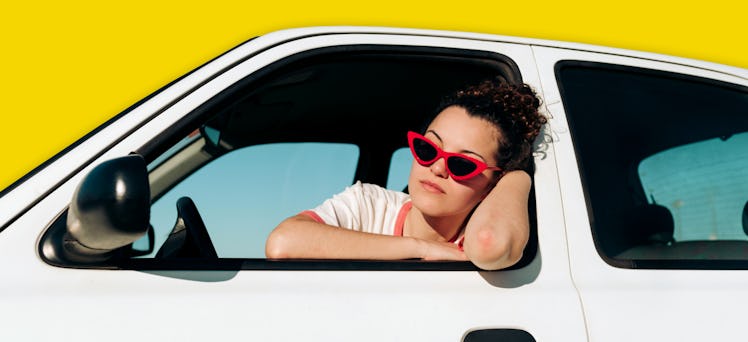
Experts Explain Why You Might Have To Skip Summer Road Trips During The Coronavirus Pandemic
In light of the ongoing coronavirus pandemic, you're probably wondering what your summer travel plans will look like. Social distancing guidelines will likely be in place for the foreseeable future, but does that mean you should cancel any upcoming trips? Experts weigh in on how safe it might be to go on a road trip this summer. Here's why you might want to put a pause on any road trips in the coming months.
According to the Centers for Disease Control and Prevention (CDC), there are over 1.2 million confirmed cases of COVID-19 in the United States, the illness caused by the novel coronavirus, as of Thursday, May 7. Some states began loosening stay-at-home orders at the end of April, but Dr. Rachel Vreeman, M.D., MS, a professor of pediatrics and Chair of the Department of Global Health and Health System Design at Ichan School of Medicine at Mount Sinai, says this isn't an all-clear for summer vacations. "This does not give us a green light for traveling as normal."
As of Friday, May 8, the CDC advises against non-essential travel, especially if you are sick. If you think you can cancel your flight in favor of a road trip, you might want to reconsider. Vreeman says, "It might be easier to keep yourself safe in the confines of your car," but that doesn't mean it's a foolproof method of travel during the coronavirus pandemic. She explains, "The huge disadvantage to a road trip is that you still might be bringing the virus along with you to new parts of the country."
It's the possibility that you might travel while being asymptomatic that throws a wrench in any road trip plans. Karen Levy, Ph.D, MPH, an environmental microbiologist and epidemiologist and associate professor of environmental health at Emory University's Rollins School of Public Health, previously told Elite Daily, "There is good evidence to suggest that people with no symptoms can transmit the virus."
If you were to become sick with the virus while traveling across the country, Vreeman warns you could put others at risk and you might not be able to get the care you need: "If you carry the virus with you, more rural locations may not have the health care facilities that you would need if you get sick."
The current state of testing and lack of a COVID-19 vaccine also adds to why summer travel is so risky. Vreeman explains, "We need excellent COVID-19 testing to be in place and widely available, and we need a vaccine as soon as possible."
While not traveling on a road trip is the best way to stay safe, Dr. John Swartzberg, M.D., F.A.C.P., clinical professor of infectious diseases and vaccinology at UC Berkeley School of Public Health, tells Elite Daily that if you have to travel, you should avoid overnight stays. "People should not travel unless they can avoid public transportation, dining out, staying in hotels, and can [implement] social distancing," says Swartzberg. Even though experts have recommendations for would-be travelers, Swartzberg says, "The safest thing to do is to stay home."
Canceling your summer trips may not be what you want, but you can know you're doing your part to slow the spread. It's important to be patient with re-opening the country, in order to stay safe. Vreeman says, "It is going to take weeks, if not months, to know whether the COVID-19 virus remains quieted down enough after these re-openings for any activities to carry on safely."
The best thing to do is follow the CDC guidelines until travel recommendations change. According to Vreeman, "The wisest strategy at this moment is likely to cancel what you can and then see how the situation evolves and what might be possible as the months go along."
If you think you’re showing symptoms of coronavirus, which include fever, shortness of breath, and cough, call your doctor before going to get tested. If you’re anxious about the virus’s spread in your community, visit the CDC for up-to-date information and resources, or seek out mental health support. You can find all Elite Daily's coverage of coronavirus here.
Experts cited:
Dr. Rachel Vreeman, M.D., M.S., professor of pediatrics and Chair of the Department of Global Health and Health System Design at Ichan School of Medicine at Mount Sinai
Dr. John Swartzberg, M.D., F.A.C.P., clinical professor emeritus at the UC Berkeley School of Public Health's Division of Infectious Diseases and Vaccinology
Karen Levy, Ph.D, MPH, Associate Professor of Environmental Health at Emory University's Rollins School of Public Health